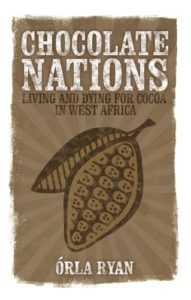 This is a comprehensive view of the chocolate industry, following the chain from African farmers to European consumers and explaining exactly why the cocoa farmers receive just 4% of the price of the average UK bar of milk chocolate. It’s well written and well researched, mixing history with present-day politics to great effect, and illustrating it all with carefully chosen personal stories.
This is a comprehensive view of the chocolate industry, following the chain from African farmers to European consumers and explaining exactly why the cocoa farmers receive just 4% of the price of the average UK bar of milk chocolate. It’s well written and well researched, mixing history with present-day politics to great effect, and illustrating it all with carefully chosen personal stories.
I thought the chapter on Fairtrade was a little, well, unfair. Fairtrade gives a guaranteed fair minimum price to farmers, and Ryan shows how in practice this is not making much of a difference right now, because general prices have risen and so other buyers are offering similar prices. But surely this misses the point – of course farmers can do better when prices are high, but what happens when prices plunge? Ryan says herself that before Fairtrade was introduced, cocoa prices had collapsed and thousands of farmers were on the breadline. Surely the value of Fairtrade is not in competing with other buyers in good times, but in providing a guarantee of sustainable earnings in bad times. Also, what about the possibility that having a large block of Fairtrade buyers offering higher prices will contribute to higher market prices in general? I’m perfectly willing to accept that Fairtrade is not a guarantee of ethical purity and that some of the celebrity-driven publicity is overblown, but I thought some of the value of the scheme was overlooked.
The other problem I had with the book was that the cover promised too much. The subtitle is “Living and Dying for Cocoa in West Africa” and the illustration is a cocoa pod packed with human skulls. On the back cover is a quote from Stephen Chan OBE saying that he “gave up eating chocolate years ago after seeing at first hand the exploitation that surrounds its production in Africa…It was about time a book like this was written.”
So I was expecting a devastating exposé, full of shocking injustices and quite a lot of death. This book doesn’t really deliver that, which is good news for the African cocoa farmer of course. I ended up feeling quite relieved that the masses of skulls never really materialised. But also I felt a little cheated every time I finished another chapter about pricing regulations and looked back at the cover. A more accurate subtitle for this book would be “Chocolate Nations: a detailed survey of supply and demand for cocoa and its effect on West African farmers.” Of course, nobody would buy the book then except for cocoa traders and academics, and therein lies the problem.
Click here to see more books I’ve reviewed.
I’m not saying that the book doesn’t describe injustice – of course it does. What I’m saying is that, to me, it’s not shocking. It’s the same injustice that occurs in many other industries, the injustice of the rich using their power over the poor. Perhaps I should give up chocolate, but then I would also have to give up wearing shirts made from cotton, using a laptop containing coltan, and a lot of other stuff in which exploitation is inherent in the process by which raw materials make it from poor producers to me, the Western consumer. As George Orwell said 75 years ago, “Under the capitalist system, in order that England may live in comparative comfort, a hundred million Indians must live on the verge of starvation–an evil state of affairs, but you acquiesce in it every time you step into a taxi or eat a plate of strawberries and cream.” While much has changed since then in political terms, with the dismantling of European empires and the establishment of independent governments, Orwell would find today’s economic relations grimly recognisable from his own time. This book does a good job of explaining why, in a very fair and balanced way, without assigning much blame or suggesting many solutions. I would recommend it to those with a particular interest in cocoa/chocolate, or those wanting a detailed example of how the gap between rich and poor often increases through the economic forces inherent in the system we have chosen for ourselves.
Click here to read other people’s reviews of Chocolate Nations on Amazon.



There are 3 comments
Chocolate Nations was briefly reviewed here in Socialist Review
http://www.socialistreview.org.uk/article.php?articlenumber=11594
Have to say I’ve not heard many positive things about it, so won’t pick it up. I’ve recently read a couple of books from Zed – one on Iran and one on Egypt, which have been excellent, though very highly priced considering their length.